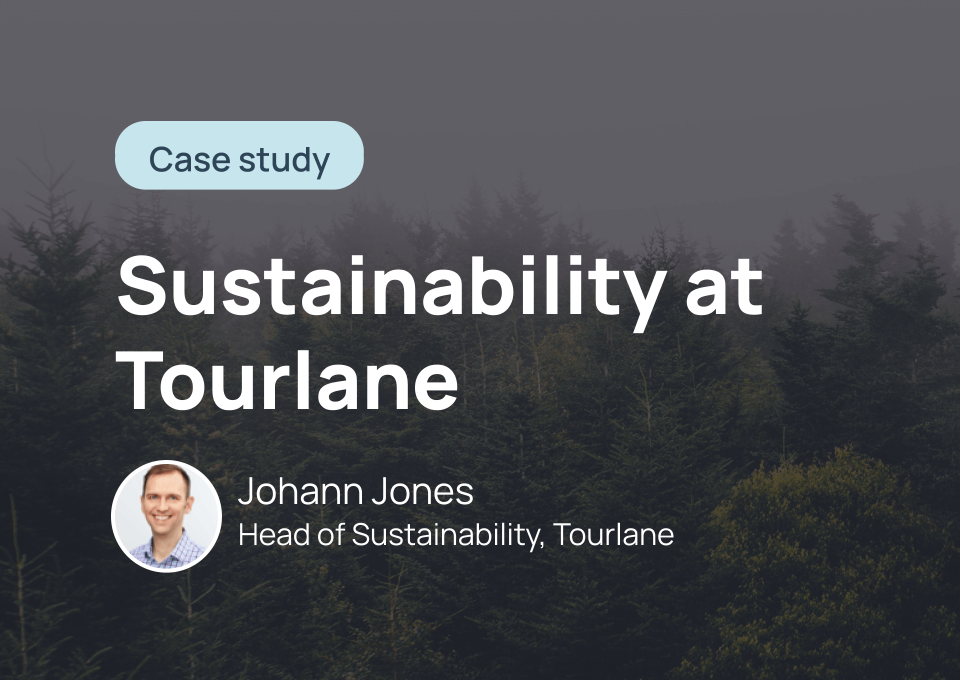
Tourlane is an emerging name in the travel industry throughout Europe, creating an end-to-end experience for booking unique individual trips based on advanced technology and travel expertise. They offer customized trips across South America, Africa, Europe, to 50+ destinations worldwide.
Sustainability is one of the company’s key values and they are taking action to operate climate neutrally and reduce their emissions on all levels. We’ve asked Johann Jones, their Head of Safety and Sustainability, to talk about this startup's efforts to reduce their carbon emissions and improve the sustainability of their organization.
A Path towards Carbon Neutrality and Sustainable Development Goals
Step 0 - Evaluate your carbon footprint & offset it
The initial step Tourlane took was understanding where they stood on emission rates and how they could proceed to reduce them. Over 95% of their carbon emissions come from their customers’ trips and flights, so their main objective was to tackle these emissions by measuring them and looking for ways to minimize them. Offsetting in the travel industry is just an initial line of accountability. This is the so-called ‘step zero’ and is considered by the company to be just the very beginning of their efforts to follow through on their climate change pledge. With the help of professional corporate footprint calculation services, they were able to measure all of their emissions, including Scope 3, then fully compensate them via selected programs.
The chosen offsetting projects were aligned with developing regions and countries that the company offers as travel destinations. Specific carbon offsetting initiatives were chosen with the goals of poverty reduction and gender equality, two of the United Nations’ seventeen Sustainable Development Goals.
Step 1 - Reduce emissions across the whole business model
The next step is described by Johann as a phase for the reduction of CO2 emissions where possible. The mantra of Tourlane’s sustainability is to go beyond the status quo and take incremental steps. Going beyond ‘step 0’ is important for staying on track with their climate-related goals and ensuring that they are not relying solely on offsetting programs.
In the office: They actively work on making their office more sustainable and engaging employees in reducing their own carbon footprints. For example, they serve only vegetarian food, use energy sparingly, and work on waste reduction. We’ll describe more of their internal sustainability initiatives below.
In the product: One of Tourlane’s initial steps is participating in the ‘rail-to-fly’ program for some European regions: a plan designed to replace short, connecting flights with train rides. This program is offered for both customers and employees. The team members who are travelling for work are required to choose this type of ticket when available. The company supports customers in changing their behavior - opting towards sustainable choices is an ongoing process. In the future, it is expected to provide these customer choices as a default setting, maximizing their impact.
Step 2 - Eliminate emissions
The ultimate goal, according to Johann, is the elimination and avoidance of carbon emissions in all company activities. For example, the existing office has switched to 100% renewable energy, and the new office will operate on green energy from the very beginning, as well as using cloud servers powered by renewables. The elimination of carbon emissions is the most effective way to fight climate change and they will keep looking for ways to avoid emissions.

Tourlane team on the Global Climate Strike, September 2020
Establishment of a Sustainability Council
Sustainability has always been an important value for their founders and team members. One of the first actions to transform the personal mission to the company’s climate action was to assign Johann to a full-time position as Head of Safety and Sustainability. This gave employees a single point of contact to address their ideas. As more people across the company started to engage in the topic, the idea of creating a green team, or the so called “Sustainability Council”, appeared. The sustainability council holds occasional meetings where its members discuss ways to further develop the organization's green efforts.
The drive to make Tourlane a sustainable travel company came directly from the culture of the company itself where the reduction of environmental impact was essential to the founders and employees. “The establishment of a Sustainability Council gave people within the organization a voice and allowed their ideas to have a real impact” said Johann, “We focus on small steps that are scaled up toward bigger yearly impacts”. The reduction of office waste and sponsoring meat-free lunches were just a few examples of what the sustainability council has been able to achieve on top of the ongoing carbon offsetting initiatives.
Internal actions to become more sustainable & engage employees
- Employee “Green month”
The Green month was an initiative that came from the Sustainability Council with the goal to educate and learn from each other while improving areas outside of our immediate work life. All suggested initiatives were structured by weeks - one focus at a time - transportation, knowledge sharing, travel tips, at home tips, and year-round sustainable actions. Additionally, they encouraged employees to use the Active Giving app throughout the entire green month. As a result, active team member participation and the use of the app combined resulted in more than 200 trees planted which the company pledged to double.

- Small improvements in the office space
Small daily choices in the office can scale to larger yearly impacts. Tourlane has incorporated plant-based milk products, LED bulbs, smart office energy technology, reduced trash bins and plastic bags, support of local food and cleaning supplies sellers.
- Company-wide spread of the sustainability report
This year, Johann prepared a detailed and impactful report and shared it with all of the team members. It helped to gain attention to the impacts of the organization. When you show your team that together you used over 50,000 sheets of paper, or 5,600 less plastiс trash bags than last year, it makes emission data more tangible. Many employees were surprised by the figures and it reinforces how meaningful adjustments in office consumption have an impact.
- Sustainability input in onboarding process
They have also incorporated some sustainability topics into the onboarding process, educating the new employees on the existence of the Sustainability Council, why we provide only vegetarian food, and simple everyday things like why it’s important to separate waste and crush milk cartons.

A screenshot from the onboarding process.
- Team cleanups
Once group meetings are allowed again, they plan to participate in the cleaning of Berlin's parks in collaboration with the BSR.
- Internal #noplanet_nobusiness Slack channel
Within Tourlane, people can share ideas and useful links in the company-wide Slack channel. This creates a space for productive exchange and collaboration.
LFCA membership
First of all, membership at LFCA gives a feeling of community belonging. The Slack communication space is highly valuable and gives an opportunity to exchange ideas and questions with other members and organizations. But even more important is that LFCA provides higher level initiatives, putting essential issues at eye level. Members join forces with hundreds of other companies to collaborate on common goals. One such goal is their interest in setting a much higher carbon price. It’s a climate-action lever some policy makers are reluctant to pull despite its potential impact.
What Johann repeatedly found to be most important was committing to make continuous incremental steps that move the company towards its future climate goals. The biggest advice Johann and Tourlane have to give companies and other LFCA members is to ensure that the leadership of your organization reflects the culture and values of the company and to start with what you know and continue to learn along the way.

